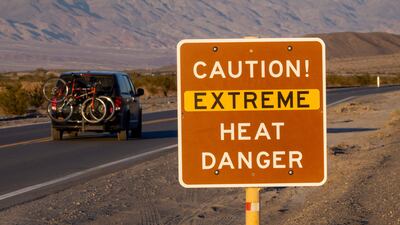North America, Europe and Asia were struggling with record-breaking temperatures and warnings from authorities to stay out of the sun, amid killer heatwaves, the latest reminder of the world’s dangerously warming climate.
The record-breaking temperatures come after researchers from the National Oceanography Centre in England said that Nasa satellite imagery showed "frightening" changes in the world's seas.
The centre's report last week said that climate change was having a potentially devastating impact on marine life and, in many areas, changing the colour of the ocean from blue to a greenish colour, a phenomenon thought by experts to be linked to a rise in the number of phytoplankton, microscopic life that help the oceans store carbon from the atmosphere.
Earlier this month the world saw its hottest day, with the global average temperature passing 17 celsius, according to the US National Centres for Environmental Prediction. On Saturday, Europe may have reached its hottest temperature, at 54 celsius in Sardinia and Sicily.
The European Space Agency said the searing heat on the two islands was "potentially the hottest temperatures ever recorded in Europe".
A powerful heatwave stretching from California to Texas was expected to peak, according to the US National Weather Service, which warned of an "extremely hot and dangerous weekend".
Arizona's state capital Phoenix recorded 16 straight days above 43 degrees Celsius, en route to an expected 46 Celsius.
Death Valley danger
California's Death Valley, one of the hottest places on Earth, is also set to register new peaks on Sunday, with the mercury possibly rising to 54C.
Authorities have been sounding the alarm, advising people to avoid outdoor activities in the daytime and to be wary of dehydration.
At a construction site outside Houston, Texas, a 28-year-old worker, who gave his name only as Juan, helped complete a wall in the blazing heat.
"Just when I take a drink of water, I get dizzy, I want to vomit because of the heat," he told AFP.
The Las Vegas weather service warned that assuming high temperatures naturally come with the area's desert climate was "a DANGEROUS mindset! This heatwave is NOT typical desert heat".
Southern California is fighting numerous wildfires, including one in Riverside County that has burnt more than 7,500 acres (3,000 hectares) and prompted evacuation orders.
Further north, the Canadian government reported that wildfires had burnt a record-breaking 10 million hectares this year, with more damage expected as the summer drags on.
In Europe, Italy faces weekend predictions of historic highs with the health ministry issuing a red alert for 16 cities including Rome, Bologna and Florence.
The weather centre warned Italians to prepare for "the most intense heatwave of the summer and also one of the most intense of all time".
The thermometer is likely to hit 40C in Rome by Monday and 43C on Tuesday, smashing the record of 40.5C set in August 2007.
The Acropolis in Athens, one of Greece's top tourist attractions, will close during the hottest hours on Sunday, for the third day running.
Extreme weather events rise
In France, high temperatures and resulting drought are posing a threat to the farming industry, earning Agriculture Minister Marc Fesneau criticism from climatologists for having brushed aside conditions as "normal enough for summer".
This June was the second-hottest on record in France, according to the national weather agency, and several areas of the country have been under a heatwave alert since Tuesday.
There is little reprieve ahead for Spain, whose meteorological agency warned that a new heatwave on Monday through Wednesday will bring temperatures above 40C to the Canary Islands and the southern Andalusia region.
As torrential rains lashed northern Japan on Sunday, a man was found dead in a flooded car, a week after seven people were killed in similar weather in the country's south-west.
Parts of eastern Japan are expected to reach 38-39C on Sunday and Monday, with the meteorological agency warning temperatures could hit previous records.
In South Korea, rescuers on Sunday battled to reach people trapped in a flooded tunnel, after heavy rains for the last four days triggered floods and landslides that killed at least 33 people and left 10 missing.
The country is at the peak of its summer monsoon season, with more rain forecast through Wednesday.
In northern India, relentless monsoon rains have reportedly killed at least 90 people, following burning heat.
Major flooding and landslides are common during India's monsoons, but experts say climate change is increasing their frequency and severity.
China on Sunday issued several temperature alerts, warning thermometers could reach 40-45C in the partly desert region of Xinjiang, and 39C in southern Guangxi region.
Morocco was slated for above-average temperatures this weekend with highs of 47C in some provinces – more typical of August than July – sparking concerns for water shortages, the meteorological service said.
In Iraq, where scorching summers are common, 37-year-old Wissam Abed usually cools off from Baghdad's brutal summer by swimming in the Tigris river.
But as rivers dry up, so does the age-old pastime.
With temperatures near 50C and wind whipping through the city like a hairdryer, Mr Abed stood in the middle of the river, but the water only comes up to his waist.
"Year after year, the water situation gets worse," he told AFP.
While it can be difficult to attribute a particular weather event to climate change, scientists insist that global warming – linked to dependence on fossil fuels – is behind the multiplication and intensification of heatwaves.
The EU's climate monitoring service said the world saw its hottest June on record last month.











